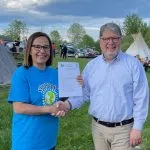
Kim McKay-McNabb is not your average therapist
We live in a world where people are encouraged to talk about their feelings, but are also ostracized for seeking help – this is something Dr. Kim McKay-McNabb hopes to change.
Her drive to help others began in childhood when she spent time in the hospital.
“When there was another kid in the hospital, I would try to make them feel better,” said McKay-McNabb. “I was this intuitive caring nurturing person.”
This continued while in foster care. It was during this time she read books such as Halfbreed by Maria Campbell and April Raintree by Beatrice Mosionier.
“As I read these books, I started to feel like I wasn’t alone and that possibly there were other brown girls like me that were thrown into a system they had no control over,” said McKay-McNabb. This drive to simply stay human and treat people with kindness would lead McKay-McNabb to complete a Ph.D. in clinical psychology.
She has since worked with the Federation of Sovereign Indigenous Nations (FSIN) on its suicide plan and with other communities around the province on whatever they needed in terms of mental health services.
Today, she is the executive director of the White Raven Healing Centre, an outpatient treatment centre, where she helps people with mental health, wellness, and substance misuse.
“My passion is helping others who struggle with mental health substance use challenges,” said McKay-McNabb, which is something she’s been doing for the past 25 years.
Two years ago, she began working at White Raven.
“One of the things that drew me here (is) they also have the cultural aspects integrated into the centre,” said McKay-McNabb. “I feel culture is a part of the healing that our people need to do.”
She’s noticed adding culture to treatment services has positively impacted the progress of patients.
“What our people say is if they could have some kind of foundation of culture that it would help enhance their quality of life,” said McKay-McNabb. “So that was the draw when I came to White Raven because there is a clear connection of mental health, culture, and substance use.”
As a clinician, McKay-McNabb also believes in adding the cultural component because the stereotype of going into a room and pouring your heart out to a stranger is not going to work for everyone.
“Things are not one size fits all,” she said.“I always argue (that) First Nations people have many healing methods, so why do we always think the western way is the best practice because it’s not always. We have options to access natural teachings that have been used for years, and our medicine people are who we look at to guide that, and when we get that guidance, it can be helpful.”
She also believes having a similar background as her patients helps in the healing process.
“Our people want to see a brown therapist,” said McKay-McNabb. “They don’t want to have to explain all this historical trauma that we as (Indigenous) people know, or explain it to people who don’t have culturally responsive or culturally respective practices.“

